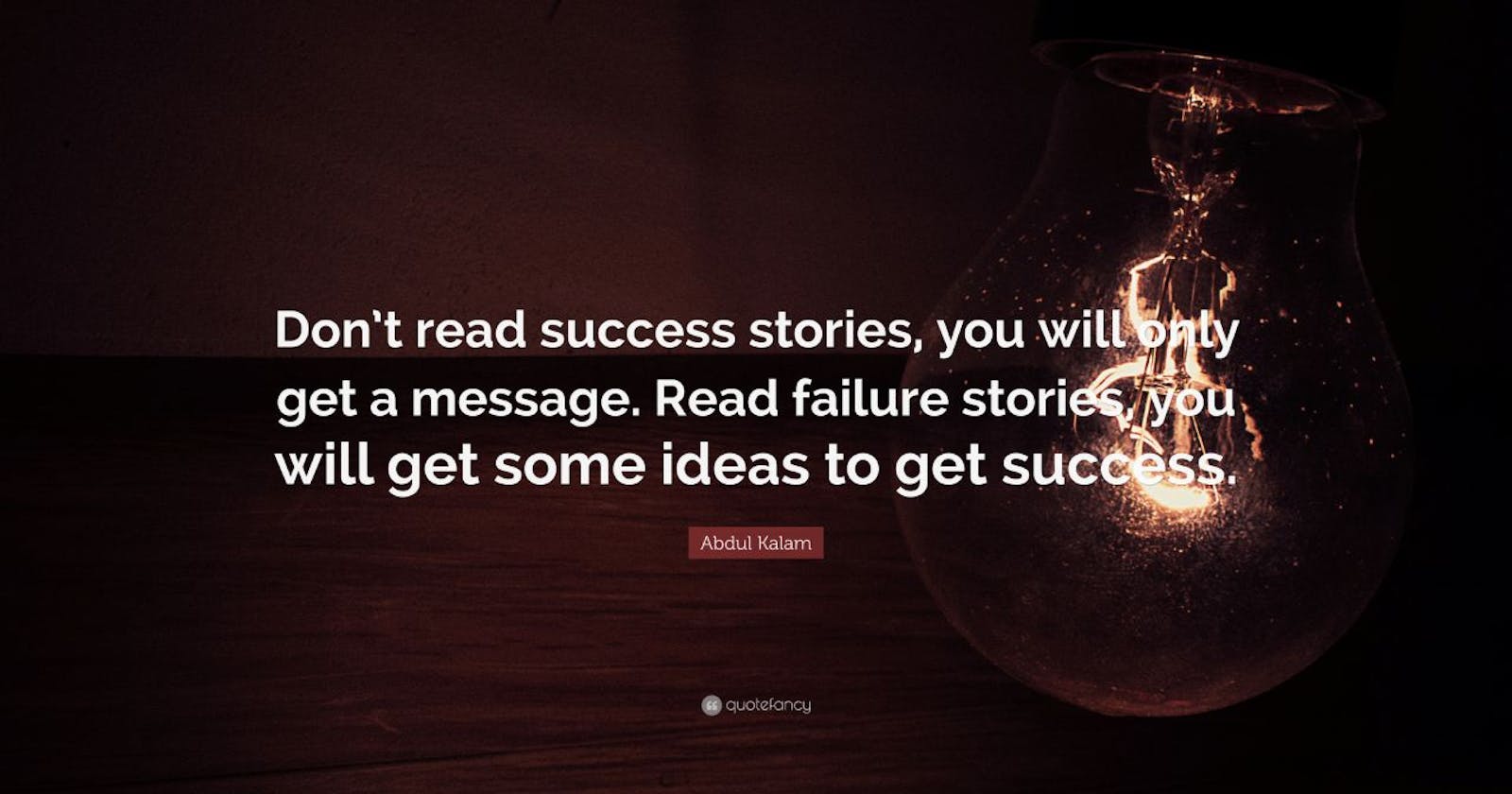I wrote a chaotic article a few weeks back about the struggles I was facing as a beginner technical writer (by the way, when does one lose that beginner title?). I was almost at the stage of a mental breakdown at the time and I was really sensitive. I badly needed validation from other beginner tech writers to stay afloat so I posted the article to some tech communities and asked if anybody at all could relate to it.
It quickly got engagements from members of the Write the Docs community and their opinions were mainly around the 4 major areas of concern in the article which was:
- API/software documentation
- OpenSource contribution
- The use of Git
- The use of Markdown
I learnt a lot through their feedbacks and I’ll share below:
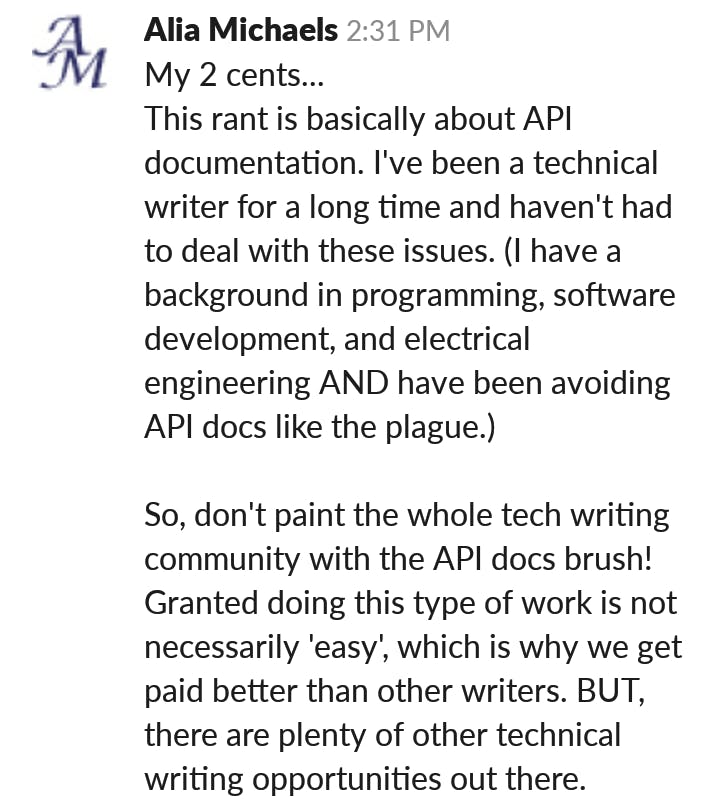
This comment had me wondering if there was a clear cut difference between a technical writer and a technical content writer. And if there was any difference, could it be that the distinguishing factor was that a technical content writer would likely have no use for API/software documentation –or the use of Markdown, Git and contributing to OpenSource –were they more concerned with making simple tutorials and how-to-guides and blogposts on tech related issues? I went in search of an answer and found this article.

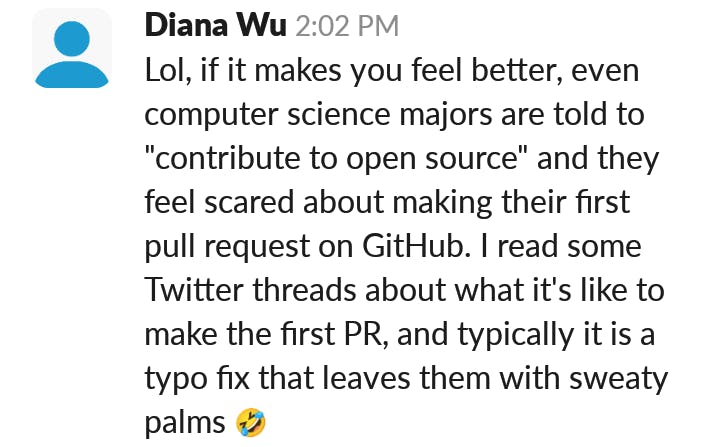
These comments helped me to understand I was not alone, I was basically almost at the same level of Git knowledge as some senior developers seeing as most of them don’t go past the very basics of Git in their everyday operations. But guess what? Unlike me, they’ll never tell you they really don’t know how to use Git!
Oh, and I now know how to use some Git commands like git init, git add, git status, how to make a commit, create a repository on Github and push to the repository!
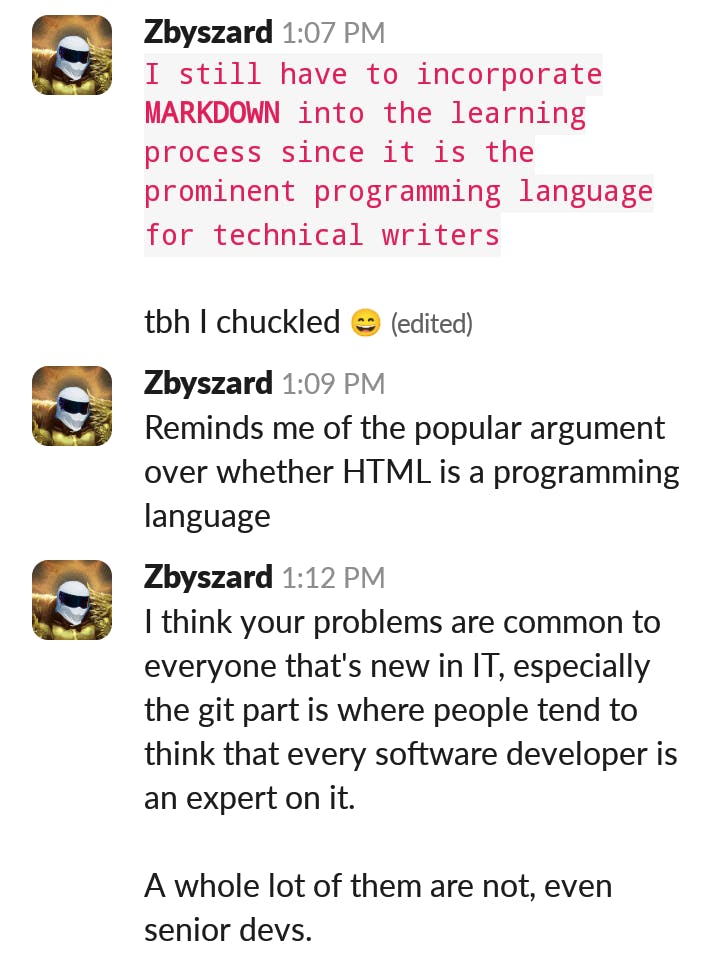
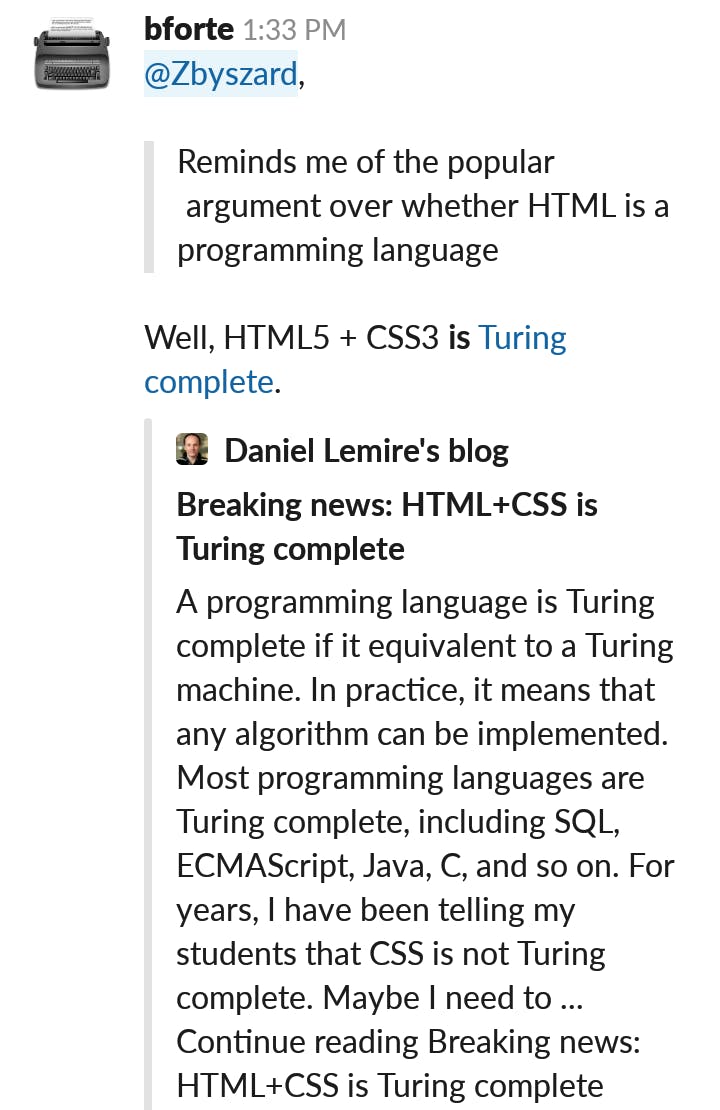
Then these comments helped me to know the main difference between a markup language and a programming language and the fact that ‘markdown’ is actually a pun on markup (silly, I know). I also got to know what it meant for a language to be "turing complete"
Anyway, it was all fun and games until someone said the article “gave him a headache”. This caught the interest of one of the moderators who thought his comment wasn’t being constructive so he was issued a warning. He didn’t think the warning was justified so he left the community. The situation sparked a lot of tension among community members with most of their arguments basing on if he was wrong or right with his comment.
I personally didn’t find a problem with his comment because honestly, that's what I wanted my article to do. To give people a headache! I wanted readers to have a feel of just how chaotic technical writing was in my head, I wanted them to feel exactly what I was feeling, I badly wanted someone to relate! But just as I was reading every comment and learning new words like Neurodivergent, a kind woman sent me a DM, I’ll share it below
Hi @Shallie — Heads up: this is a rather long post. I did not plan it that way, but I couldn’t stop writing :grin: I’m so sorry that you’re dealing with this so late in your evening. You simply wrote how you felt, and shared your experience. And I guess it’s like that proverbial pebble tossed in the ocean — it ripples out into endless, uncontrollable movement. That said, I do actually think that I understood where Steve was coming from: he’s a very experienced, very technical person (like me). And he did not put himself in the shoes of someone new to the programmer part of technical writing. Which I want to hasten to add is NOT the only style of technical writing. Not by a long shot. But he and I (and many, but not all Write the Docs documentarians) gravitated to it based on our backgrounds. On the other hand, I would like to offer an opinion, and it is just that: my opinion, which you should feel free to take with a grain of salt, and toss it away if it’s irrelevant for your purposes: I get frustrated when women in tech present themselves as barely able to understand things. I worked with a woman product manager who was clearly smart: she had a mechanical engineering degree from a well-respected university. But when hearing something new or complex, she’d constantly say, “that makes my head explode!” And so of course people started to devalue her ability and technical contributions. After all, if she did not value herself, why would someone else?! As well, although in the WTD posting, you clearly expressed the need to vent, people who come across your blog post in other ways will not have that context, and what they’ll read is some pretty emotional writing. And unless they are quite open-minded or have plenty of experience with working with capable women, it will just reinforce their stereotypes: women are too emotional to work in tech. And with the internet, your post will live on and on, long after you’ve mastered the very things that are a bit frustrating now. But you won’t be able to undo the appearance of “I’m not really qualified to work in this field.” So perhaps you’d consider being a bit more restrained in future blog posts, and maybe ask a few experienced (mentor-like, even if they’re not official mentors for you) people to take a quick read before you publish. That would help you make a more professional presentation. And you’ll not be unhappy to have the posts re-discovered years from now. All that said, I am a senior (soon to be 59 years old), and when I graduated with my engineering degree in 1986, there were even fewer women in tech than now. And we were told to basically “be men” — we wore suits with shoulder pads. We never let any work colleague see us as emotional. And we did not even chat about “women’s hobbies” like crafting and cooking. Because we knew that we were not welcome, and so we did not want to make any avoidable differentiation between us and the men. And so I am very happy that things have changed. A LOT. And being in Write the Docs, and getting to know and work with younger people from around the world is pure joy. And makes me feel like it was worth it to put up with what I did. Because it is better now.
Failure/Struggle is underrepresented!
Tech Twitter, omg! It feels like everyone on there has everything all figured out, nobody has ever received that dreadful rejection letter, everybody works and earns huge remotely, somehow everybody just knows what to do and how to do it so much that it becomes almost impossible to ask questions there without feeling like a complete dullard. However one day I saw a tweet, someone was basically asking for failure stories.
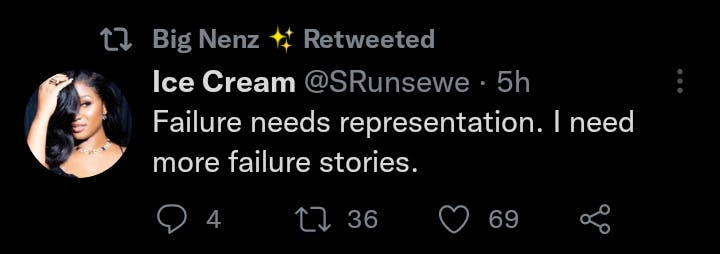
That and the advice above motivated me to write this very article. So to give this article a bit of structure, I’m going to reply to the advice.
Breaking the Stigma against struggling/failure
This year’s international women’s day celebrations’ theme was “#BreakingTheBias”. I remember being in a twitter space where a speaker said it becomes exhausting when women are asked to break biases that they didn’t put in the first place. That hit me like a rock! Because I promise you, I wasn’t even born when it was decided that women were too emotional to be in tech. So I wonder how it becomes part of my job description to break that stereotype BY STILL NOT BEING EMOTIONAL! Oh, the irony of it all!
Imagine not communicating how I feel, when I’m facing difficulties understanding something, when a concept confuses me, when it all becomes too much and I suddenly want to give up and run away. How does hiding my struggles and failures help to break the bias? And how does not being sensitive and emotional reinforce the stereotype?
I feel it only reinforces these stereotypes when women in tech don’t embrace their femininity. It leaves the others who do so, hanging out to dry. It illuminates their “weaknesses” because people would believe it’s their personal problem when they’re struggling or failing.
I also don’t think I presented myself as barely able to understand things, I clearly stated in my article that I am a renaissance person and I was over learning which was causing frictions in my learning process. I also stated that I was actively doing the work to get my head on straight! But the fact that I was doing that doesn’t stop me from documenting this one time I was in a rot.
If more women didn’t stop wearing shoulder padded suits, many women wouldn’t have been wearing beautiful gowns to work today. So, imagine my joy in the future when more women get comfortable talking about their struggles and failures knowing I was one of the people that made it happen through my chaotic and emotional blog posts. I am honestly not looking to be professional on my blog. I legit created it to document my tech journey. That means both the good and bad days and all in between.
What can responsible, ethical and accountable tech do?
I understand that some people tend to easily grasp complex topics and in fact, they sometimes experience no struggles at all when it comes to learning and implementing new concepts but that’s just what it is, SOME. That does not mean there’s something wrong with the other demographic of people (of which I’m a part) who learn differently! Is it then okay to downplay us like “oh, come off it, this is easier than you make it out to be, you’re just dumb, you don’t deserve to be in tech where so many smart people work”?
Or “oh, even though you’re facing difficulties, don’t show it, be quiet till you figure things out or else people would believe you’re just dumb and don’t deserve to work in tech.” That is why responsible, ethical and accountable tech is so important, not just for making healthy tech policies that help tech become more valuable than destructive to the society, but for the tech enthusiasts also, who are actively involved in providing these tech solutions. Think about it, what good is tech if the technicians struggle silently? How does help come their way? How do they get better, to make better tech products, services and policies?
In conclusion…
Maybe it’s my star sign as a stubborn Taurus, but I still didn’t ask any experienced Mentors to take a look at this article before I published it. I already have my anxiety levels rising when the editor at the company where I work edit my articles. I’m having my fair share of those, I should be allowed to breathe in here.
A sensitive person can be in tech, an emotional person can be in tech, a person with mental health disorders can be in tech, a woman can be in tech, I can be in tech. In fact, we are all in tech! But we are not encouraged to tell people, how then would other people like us know that they’re not alone on their journey. Who would give them the healthy validation that they need? How would they know not to give up because so many people like them are thriving in the tech industry?
Soon as I get the hang of this one, I am going to go ahead to learn other forms of technical writing. I want to do it all, I will do it all and I’ll write when I’m winning and when I’m failing.
I believe the beauty of everything lies in documenting this journey at every point, the good and the bad. I’m not scared of having my writing from years ago show up in the future, it’ll only remind me of how far I’ve come, how the struggle was worth it because I now have everything I worked so hard for.

